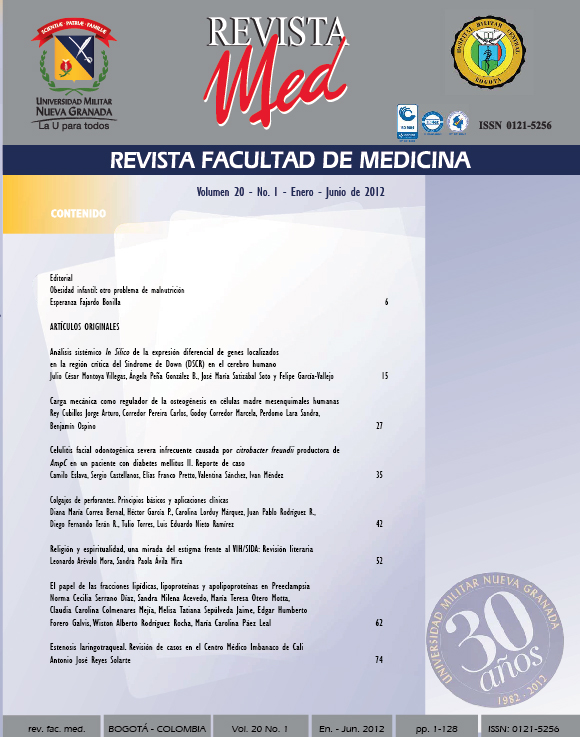Religión y espiritualidad, una mirada del estigma frente al VIH/SIDA: revisión literaria
Resumen
En el presente artículo se hace una revisión de la literatura acerca de la religión, la espiritualidad y su papel en la epidemia del Virus de Inmunodeficiencia Humana y del Síndrome de Inmunodeficiencia Adquirida (VIH/SIDA). Primero se determina el contexto general de la religión vs la espiritualidad a la luz de vivir con VIH. También se hará un abordaje de las limitaciones existentes en las principales religiones alrededor del mundo, con respecto al estigma de la enfermedad. Y finalmente, se describe cuales han sido las acciones beneficiosas por parte de las comunidades religiosas.
Descargas
Lenguajes:
esReferencias bibliográficas
Royce RA, Seña A, Cates WJJ, Cohen MS. Sexual transmission of HIV. N Engl J Med. 1997; 336(15): 1072-8. 2. Taylor B. HIV, stigma and health: Integration of theoretical concepts and the lived experiences of individuals. Journal of Advanced Nursing. 2001; 35: 792-798.
Bueno A, Madrigal A, Mestre F. El SIDA como enfermedad social. Cuadernos de Trabajo Social. 2005; 18 :33-55.
Nanda S, Pramanok A. HIV/AIDS in India: stigmatization as a process of communication and social relationship. Cuadernos de Información. Pontificia Universidad Católica de Chile. 2009; 25: 105-117.
Encuesta Nacional de Demografía y Salud. Profamilia. Ministerio de Protección Social. Republica de Colombia. 2010.
Simbaqueba V., Pantoja C., Torres B, Ávila C. Voces Positivas, Resultados del Índice de Estriga en personas que viven con VIH en Colombia. Red Colombiana de Personas que Viven con VIH RECOLVIH 2011.
Quiceno J, Vinaccia S. La salud en el marco de la psicología de la religión y la espiritualidad. Diversitas Perspectivas en psicología. 2009; 5(2): 321- 336.
Maristany C. El poder Terapéutico de la Escucha en Medicina Crítica. HUMANITAS, Humanidades Médicas. 2008; 27.
Hill PC, Pargament KI. Advances in the conceptualization and measurement of religion and spirituality. Implications for physical and mental health research. Am Psychol. 2003; 58: 64-74
Guillory JA, Sowell R, Moneyham L, et al. An exploration of the meaning and use of spirituality among women with HIV/ AIDS. Altern Ther. 1997; 3: 102-108.
Dunbar HT, Mueller C, Medina C, et al. Psychological and spiritual growth in women living with HIV. Social Work. 1998; 43: 144-154.
Koenig, HG. Concerns about Measuring "Spirituality" in Research. The Journal of Nervous and Mental Disease, 2008;196(5): 349-355.
Green, E. C. Faith-based organizations: Contributions to HIV prevention. The Synergy Project. United States Agency for International Development. 2003.
Kilbourne AM, Justice AC, Rollman BL, et al. Clinical importance of HIV and depressive symptoms among veterans with HIV infection. J Gen Intern Med. 2002; 17: 512-20.
Santana M, Dancy B. The stigma of being named “AIDS carriers” on Haitian-American women. Health Care Women Int. 2000; 21(3): 161-71.
Ironson G, Solomon G, Balbin EG, et al. The Ironson-Woods Spirituality/Religiousness Index is associated with long survival, health behaviors, less distress, and low cortisol in people with HIV/AIDS. Ann Behav Med. 2002; 24: 34-48.
Yi M, Mrus J. Religion, Spirituality, and Depressive Symptoms in Patients with HIV/AIDS. J Gen Intern Med. 2006; 21: 21-27.
Simoni JM, Ortiz MZ. Mediational models of spirituality and depressive symptomatology among HIV-positive Puerto Rican women. Culture Divers Ethnic Minor Psychol. 2003; 9: 3-15.
Ickovics JR, Hamburger ME, Vlahov D, et al. Mortality, CD4 cell count decline, and depressive symptoms among HIV-seropositive women: longitudinal analysis from the HIV Epidemiology Research Study. JAMA. 2001; 285: 1466-74.
Atkinson JH, Grant I. Natural history of neuropsychiatric manifestations of HIV disease; Psychiatr Clin North Am. 1994; 17: 17-33.
Siegel K, Schrimshaw EW. The perceived benefits of religious and spiritual coping among older adults living with HIV/AIDS. Journal for the Scientific Study of Religion. 2002; 41: 91-102.
Koenig HG, George, LK, Siegler IC. The use of religion and other emotion-regulating coping strategies among older adults. The Gerentolosist. 1998; 28: 303-310.
Prado G, Feaster DJ, Schwartz SJ, Pratt IA, Smith L, Szapocznik J. Religious involvement, coping, social support, and psychological distress in HIV-seropositive African American mothers. AIDS Behav. 2004; 8: 221-35.
Kaldjian LC, Jekel JF. Friedland G. End-of-life decisions in HIV-positive patients: the role of spiritual beliefs. AIDS 1998; 12: 103-107.
Lorenz K, Hays R, Shapiro M, Cleary P, Asch S, Wenger N. Religiousness and spirituality among HIV-infected Americans. J Pall Med. 2005; 8: 774-81.
Prisla Ücker P, Campio M, Tiellet M. Psicologia em Estudo, Maringá. 2008; 13(3): 523-530.
Tuck I, McCain NL, Elswick RK Jr. Spirituality and psicosocial factors in persons living with HIV. J Adv Nurs. 2001; 33: 776-83.
Zilber C. Psychotherapeutic strategies for coping with HIV infection. What Mental Health Practitioners Need to Know About HIV and AIDS. San Francisco, Jossey-Bass. 2000; 37-44.
Somlai AM, Heckman TG, Kelly JA, Mulry GW, Multhauf KE. The response of religious congregations to the spiritual needs of people living with HIV/AIDS. J Pastoral Care. 1997; 51: 415-26.
Kiw E. Religion as a community resource for wellbeing: prevention, healing, and empowerment pathways. J Soc Issues. 1995; 51: 177-93.
Mc Enany G, Hughes A, Lee K. Depresión y HIV Una Perspectiva de Intervención sobre una Compleja Relación. RET, Revista de Toxicomanías. 1998; 15.
Yoffe L. Efectos positivos de la religión y la espiritualidad en el afrontamiento de duelos. Psicodebate, 2007; 7: 193-205.
Anderson J, Doyal L. Women from Africa living with HIV in London: a descriptive study. AIDS Care. 2004; 16: 95-105
Bormann J, Gifford A, Shively M. Effects of spiritual mantram repetition on hiv outcomes: a randomized controlled trial. Journal of Behavioral Medicine, 2006; 29(4): 359-376.
Castellanos C. Atención Domiciliaria: Detección temprana de los síntomas de Burn Out en familiares que cuidan a personas con VIH/SIDA. Ciencia y Sociedad. 2009; 34(1): 120-132.
Heelas P. The New Age Movement. Oxford: Blackwell Publishers. 1996.
Cotton S, Puchalski C. Spirituality and religion in patients with HIV/AIDS. J Gen Intern Med. 2006; 21: 5-13.
Okunna C, Dunu I. Religious constraints on reporting HIV/ AIDS in Nigeria (Paper presented at the conference on "Religion, Media and Health in West Africa with a focus HIV & AIDS" 13-15 December 2006 Accra Ghana).
Oluduro O. The role of religious leaders in curbing the spread of HIV/AIDS in Nigeria, Per/Pelj. 2010; 13(3): 208-232.
Manoj K. Una perspectiva Cristiana. Perspectivas, 2002; 32(2): 1-13.
Lux S, Greenaway K. Ampliar las alianzas efectivas: Una guía para trabajar con las organizaciones religiosas en la respuesta al VIH y el SIDA. Publicada conjuntamente por la Alianza Ecuménica de Acción Mundial, Ayuda de la Iglesia Noruega, la Conferencia Mundial de las Religiones por la Paz, Church World Service y ONUSIDA. Primera edición. Noruega. Copyright 2006.
Aram K Grillo J. The Human Dimension: Voices from the Hindu World. Interreligious dialogue. World Conference of Religion and Peace Publisher Shanti Ashram 2010: 3-12.
Sen A. The Argumentative Indian. Penguin Books. 2005.
Huston S. Las religiones del mundo. Barcelona: Kairós. 2002.
Sullivan L. Las características del prostestantismo. Italia. Editorial Nerea S.A. 2008.
Torres L, Serrano I. Las iglesias protestantes en Puerto Rico ante el VIH/SIDA: Opiniones de líderes de dos denominaciones. R. Interam Psicol. 2007; 41(2): 167-176
Viteri M. Discursos sobre el VIH/SIDA: Un estudio en parejas heterosexuales viviendo con VIH/SIDA [Tesis de maestría en ciencias sociales con especialización en estudios de genero]. Quito: Facultad Latinoamericana de Ciencias Sociales. Sede Flacso; 2003.
Smedes L. Sex for Christians: The limits and liberties of sexual living. Library of Congress Cataloling Ed. Edermanns Publising co. 1994: 27-60.
La Sagrada Biblia. King James version. Grand Rapids (MI): Zondervan Publishing House; 1995. Mateo 22:39.
Discurso del Papa Benedicto XVI a los Obispos de Sudáfrica, Botsuana, Suazolandia, Namibia, y Lesotho en visita "AD LIMINA". Ciudad del Vaticano. Editorial Editrice Vaticana. 2005.
Booth K. Local women, global science: Fighting AIDS in Kenya. Bloomington: Indiana University Press. 2004.
Marshall M, Taylor N. Cómo afrontar el VIH y SIDA con comunidades con base en la fe: aprendiendo de las actitudes hacia las relaciones entre los géneros y los derechos sexuales dentro de las iglesias evangélicas en Burkina Faso, Zimbabwe y Sudáfrica. Gender & Development. 2006; 14(3): 1-11.
Mae Chan, Chiang Rai. Sermons based on Buddhist Precepts: A response to HIV/AIDS. South East Asia HIV and Development Project. December 2000. Disponible en: http://www. ahrn.net/library_upload/uploadfile/th0013.pdf
Positive muslims. HIV, AIDS & Islam, Reflections based on Compassion. Responsibility & Justice. Published by Positive Muslims. Cape Town, South Africa 2004.
Kelley L, Eberstadt N. Behind the Veil of a Public Health Crisis: HIV in the Muslim World. NBR special report. Publisher The national bureau of Asian research. 2005
Kelly L, Eberstadt N. El VIH/SIDA en el Mundo Islámico. Desidamos. Revista de la Fundación para Estudio e Investigación de la Mujer. 2005; 13(1): 20-21.
Musso S, Fanget F, Cherabi K. La religión y la educación para la prevención del VIH/SIDA: una perspectiva árabe-musulmana. Perspectivas. UNESCO. 2002;21(2): 114-122.
Steinitz L. The AIDS Pandemic: Jewish Values and Responsibilities. Journal of Jewish Communal Service. Otoño-invierno. 2005; 115-120.
Vitillo, R.A Faith-Based Response to HIV in Southern Africa: the Choose to Care Initiative. UNAIDS best practice collection. 2006: 17-20.
Actas de la 38ª reunión del Comité Central del Consejo Mundial de Iglesias. AIDS and the Church as a healing community. WCC Executive Committee statement 1987; 6:135.
Catholic Institute of Education Southern African Catholic Bishops. Conference Policy on HIV/AIDS for Catholic schools. January 2000. QNGS Disponible en: http://www.cso.za.org/ HIV_AIDS_SACBC_policy_Catholic_Schools_2000.pdf
The Ecumenical Response to HIV/AIDS in Africa (EHAIA). Plan of Action, Global Consultation on Ecumenical Responses to the Challenges of HIV/AIDS in Africa. Nairobi, Kenya, 25-28 November 2001.
Mwangi M. Community transformation: A case study of St Paul’s life long learning (SPILL), Master of Arts/post graduate diploma in community care and HIV & AIDS programme. Mainstreaming HIV and AIDS in theological education: experiences and explorations. Switzerland, World Council of Churches. WCC Publications. 2008: 19-32.
Primados Anglicanos, Informe de la reunión de Primados de la Comunión Anglicana. Apéndice III: Declaración de los Primados Anglicanos sobre el VIH/SIDA. Canterbury (Reino Unido), 17 de abril de 2002. 65. Dantley M. Critical spirituality: Enhancing transformative leadership through critical theory and African American prophetic spirituality. International Journal of Leadership in Education. 2003; 6(1): 3-17.
Informe de Católicas por el Derecho a Decidir. Premios a Obispos Católicos. Desidamos. Revista de la Fundación para Estudio e Investigación de la Mujer. 2005; 13 (1). 21-26.
Agadjanian V. Gender, religious involvement, and HIV/AIDS prevention in Mozambique. Social Science & Medicine. 2005; 61: 1529-1539.
Leong P. Religion, flesh, and blood" re-creating religious culture in the context of h iv/aids sociology of religion. 2006; 67(3): 295-311.
Regan D. Hna. La Fe, Religión y VIH/SIDA. Ponencia en el I Congreso Internacional de Actualización en VIH SID - Hospital Dr. Mario Catarino Rivas. 2007.
ONUSIDA. Guyana National Declaration on Faith and HIV. Conference in Georgetown Guyana. Reference document, December 11th 2008.
Zou J, Yamanaka Y, Muze J, Watt M, Ostermann J, Thielman N. Religion and HIV in Tanzania: influence of religious beliefs on HIV stigma, disclosure, and treatment attitudes. BMC Public Health. 2009; 9: 75.
Coleman C. The contribution of religious and existential wellbeing to depression among African American heterosexuals with HIV infection. Issues Ment Health Nurs. 2004; 25: 103-10.
Palma I. Las instituciones religiosas en la transformación normativa contemporánea en la sexualidad en Chile. Revista de Psicología, Universidad de Chile. 2008; 17(2): 9-37.
Ridge D, Williams I, Anderson J, Elford J. Like a prayer: the role of spirituality and religion for people living with HIV in the UK. Sociology of Health & Illness. 2008; 30(3): 413-428.
Bastidas F. Abordaje espiritual en el acompañamiento a personas que viven con VIH/Sida: Una perspectiva experiencial desde la fe cristiana. Revista Educación en Valores. Universidad de Carabobo. 2009; 1(11).
Sinding S. La estrategia CNN: preservativo, agujas y negociación vs. la ABC: Abstinencia, fidelidad y preservativos. Desidamos. Revista de la Fundación para Estudio e Investigación de la Mujer. 2005; 13(1). 77. Hernandez C. Ética, iglesia y VIH/SIDA: Más allá del terrorismo sexual. Presencia Ecuménica. 2009; 67: 23-27.
Consejo Mundial de Iglesias. Crear alianzas entre las iglesias y las organizaciones de personas que viven con el VIH y el SIDA. Conferencia de Iglesias de Toda el África, Pacto sobre el VIH/SIDA, Octava Asamblea General de la Conferencia de Iglesias de Toda el África, Yaoundé (Camerún), 22-27 noviembre 2003. Disponible en http://www.iglesiacatolica. org.gt/vih/svih03.pdf
Agrippa K. Teaching and talking about our sexuality: a means of combating HIV/AIDS. HIV/AIDS and the curriculum: methods of integrating HIV/AIDS in theological programmes. Geneva: WCC Publications; 2003.







.png)





